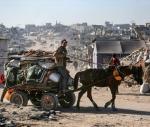You are here
Daesh and education
Feb 09,2016 - Last updated at Feb 09,2016
Many people might think that the words Daesh and education are intrinsically antithetical, and they would be right if they were referring to education in our region in an abstract way.
But education in the region, it is sad to admit, is deteriorating. That is why it should not be shocking to use both words in the same phrase.
Daesh is not necessarily associated with utter ignorance on the part of its recruits or followers, although that could be the case.
Given the fact that a few Daesh recruits are university graduates and students, it might be more precise to suggest that Daesh recruits are not characterised by lack of knowledge but by partial, limiting education.
Alexander Pope, the English poet, once said: “A little learning is a dangerous thing.”
Daesh’s recruits exemplify Pope’s aphorism.
Daesh followers’ interpretation (if that is what one has to call it) of the Islamic tradition is based on that sort of learning, as it ignores the complex layers and nuances of religion.
They often ignore the context and deep meaning of the texts.
When one listens to their recordings in Arabic, one does not have to be an expert to discover the language mistakes they make. As such, their understanding of the texts is inevitably lacking.
How is that related to the educational system nowadays?
In most of the educational systems in our region, students are spoon-fed and receive what I have no hesitation to call partial learning.
Students are hardly asked to think. At high school level they are usually encouraged to memorise. Even when it comes to subjects where one would not expect students to rely a lot on memorisation, such as mathematics and physics, memorisation becomes more and more the norm.
If a teacher decides to change the figures in a certain question that appears in a textbook, what ensues is an outcry on the part of the students and their parents.
When it comes to national exams, it is not unexpected to hear complaints about any “deviating” question.
It is not unexpected, either, to hear the mantra in defence of any exam: the questions are taken from and based on the textbook.
What is the message that students and their parents get?
That everybody has to focus on the book and should not think outside of its perimeters.
When a challenging — the word difficult is misleading — question is asked, that question, we are told, should target a small percentage of exam candidates.
Those students then go to the university level and it is unfortunate to admit that very little changes. Students tend to regurgitate what their professors say in class. They do not even read the materials assigned.
They also expect their professors to know all the answers and may be surprised if a teacher professes ignorance of an answer or says he/she needs to think about it.
What are the results of all this?
The production of imitators, not original thinkers.
Students may learn something, but their learning can be described as limited at best.
What they learn is confined to what they have been told and nothing more.
They learn very few skills and they use very little thinking.
They get two basic lessons: they learn to “respect” the authority of the textbook, without having the courage to question anything in it, and they learn to “respect” the authority of the expert, thus becoming dependent.
Education, then, becomes an apparatus for the mass production of dependents.
When graduates or undergraduates face any text or religious authority, or the two combined, they simply believe them without making sure that what is said to them is actually right.
They often believe blindly what Daesh supporters tell them.
The only way we can prevent this situation from happening is by enabling students to become mature, independent and rational, and through giving them the chance to become leaders rather than followers.
This way, we can prevent them from being benumbed customers who can easily be misled, and we can help them to become conscious and productive individuals. Change is never easy, and it will take time and effort. But if we want it to happen, we need to be patient and think strategically.
This way, we can ensure that change is for the better, not for the worse.
Students will grumble and professors will have to deal with challenges. But once the shell of dictation is cracked, all of us will relish the beauty of the spectrum of our creative students, our hope for a better, Daesh-free future.
The writer, a Fulbright scholar, contributed this article to The Jordan Times.











